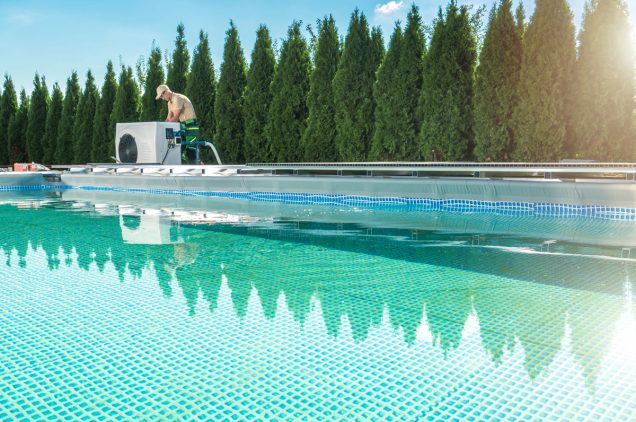How A Pool Heater Works
Heat pump pool heaters are designed to transfer heat from the outdoors into the pool water. Let’s find out how these machines operate, how big they should be and how much they cost!
How A Heat Pump Pool Heater Works
Pool water will circulate through the pool pump, passing through a filter and the heat pump heater. This heater features a fan that draws in outside air, eventually directing it over the evaporator coil. Liquid refrigerant within the evaporator coil then absorbs the heat from the outside air and it becomes a gas. Next, warm gas will pass through the compressor, which increases the heat to create a very hot gas. This gas is then passed through the condenser.
The condenser will transfer said heat from the hot gas to the cooler pool water, which circulates through the heater. The heated water returns to the pool while the hot gas returns to liquid form and back to the evaporator.
Pump pool heaters with a higher efficiency usually use scroll compressors instead of the reciprocal compressors featured in standard units. These heaters work efficiently as long as the outside temperatures remain in the 45°F-50°F range.
Choosing A Heat Pump Pool Heater
Heat pump pool heaters do cost more than gas pool heaters, but they make up for the initial price by having much lower annual operating costs. This is due to their higher efficiency, overall. With proper care and maintenance, these pool heaters should last longer than gas pool heaters. This means you will undoubtedly save money in the long run.
Always consider these three factors when choosing a heat pump pool heater:
- Size.
- Efficiency.
- Cost.
What Size Pool Heater Do I Need?
Make sure a trained pool professional performs a proper sizing analysis to determine the best heater size for your pool. Sizing the heater will involve a few things, including the surface area of the pool and typical air temperatures. Other factors could affect the heating load for outdoor pools, such as cooler night temperatures, wind and humidity levels. Pools located in areas with these conditions will require a larger pool heater.
Heat pump pool heaters are rated by Btu output and horsepower, with standard sizes including 3.5 hp/75,000 Btu, 5 hp/100,000 Btu and 6 hp/125,000 Btu. Follow these steps to calculate the appropriate size of your pool heater:
- Figure out your desired swimming pool temperature.
- Determine the coldest month’s average temperature for pool use.
- Subtract the average temperature of the coldest month from your desired pool temperature. This results in the temperature rise you need.
- Calculate the pool surface area in square feet.
- Use this formula to determine the Btu/hour output necessary for the heater: pool area X temperature rise X 12.
Determining Heat Pump Pool Heater Efficiency
The energy efficiency of these heaters will be measured by coefficient of performance (COP). Basically, the higher the COP number, the more efficient the heater. The federal test procedure for the heaters will set the test conditions at 80°F ambient dry bulb, 63% relative humidity and 80°F pool water.
COPs will range from 3.0 to 7.0, converting to an efficiency of 300%-700%. For every unit of electricity, it takes to power the compressor, you will get 3-7 units of heat from the pump.
How Much Does A Heat Pump Pool Heater Cost?
For an outdoor pool, the cost of a heater will vary based on location. Here is a cost estimate for a pool in Phoenix, with water temperature factored in:
- 78° Pool Water: $927.
- 80° Pool Water: $1,192.
- 82° Pool Water: $1,485.
